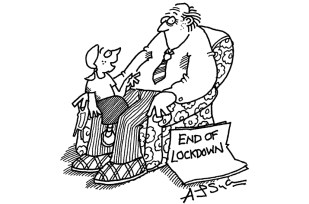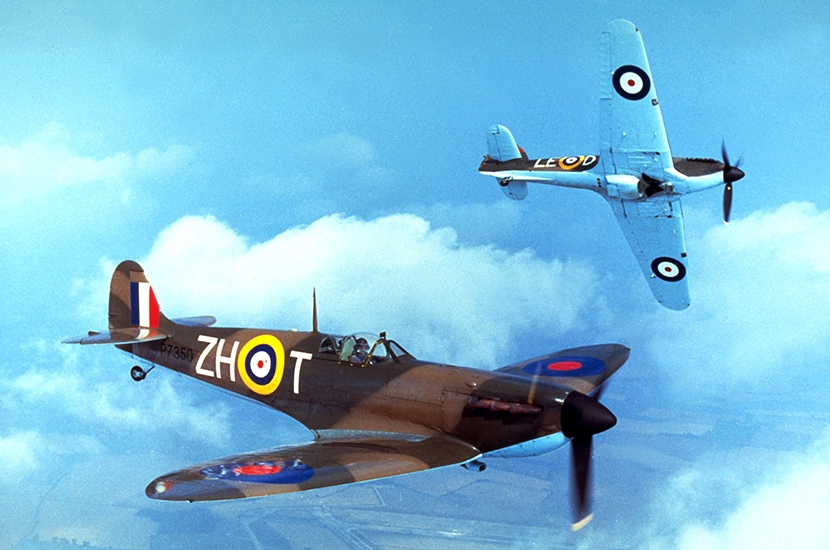The Battle of Britain, which began 80 years ago this week, occupies a unique place in our island story. Its epic moral quality, representing the triumph of freedom over tyranny, continues to resonate to this day. The RAF’s victory marked a crucial turning point in the war; it was the first time the Nazi machine had suffered a defeat. If the Luftwaffe had gained the mastery of the skies over southern England in September 1940, the Germans might well have been able to launch a vast, seaborne invasion across the Channel. Beaten in the West, the Reich had to turn eastwards, to Russia, with disastrous consequences.
What makes the tale all the more gripping is the narrow margin of the RAF’s success. The Luftwaffe had overwhelming superiority in numbers, with an attacking force of more than 2,600 planes, including 1,200 bombers and 980 fighters. That compared with a total of around 900 aircraft in RAF Fighter Command at the start of the battle in July 1940. Despite the heroism of the British pilots, the Germans’ numerical ascendancy began to make itself felt by the end of the summer. On 7 September, Sir Hugh Dowding, the austere chief of Fighter Command, warned his fellow officers that his force was ‘going downhill’.
But that same day Hermann Goering, the head of the Luftwaffe, made a major error. Thinking that Fighter Command was finished, he ordered his planes to switch the focus of their assault from the airfields to London. The change in strategy brought carnage to the East End as the Blitz began, but it gave Fighter Command a vital breathing space, during which squadrons were replenished by new planes and pilots. When the Germans renewed their offensive on 15 September, they were astonished to be confronted by reinvigorated defences. Having suffered crippling losses, the Germans abandoned the struggle. On 17 September, Hitler postponed his plans for an invasion.

The narrative of bleak adversity followed by the glorious salvation is a stirring one. Yet it can be argued that the RAF should never have been brought to the brink of defeat in early September. The fact that the Luftwaffe almost gained aerial supremacy was partly due to Fighter Command’s tactical inflexibility, poor deployment of resources and limitations in Dowding’s leadership, as well as longer-term failures in aircraft production.
A widower of Scottish descent, Dowding was a somewhat incongruous figure to be a fighter leader. Aloof, cold to the point of frigidity, he was known as ‘Stuffy’ because of his social awkwardness. But he also possessed an unconventional mind that embraced vegetarianism, spiritualism and reincarnation; he claimed that in a previous life he had been a Mongol chieftain. This unorthodoxy extended to his work in charge of Fighter Command. A visionary technocrat, he not only presided over the introduction of the revolutionary fast Spitfire and Hurricane monoplanes, but also the creation of a sophisticated ground-control network which used information from radar stations and the Observer Corps to guide the RAF fighters to the incoming targets. Under this system, Fighter Command was divided into four geographical groups, the most important of which was No. 11 in the south-east of England, commanded by the purposeful but prickly New Zealander Keith Park.
The Germans’ numerical ascendancy began to make itself felt by the end of the summer of 1940
Throughout the Battle of Britain, the central aim of Dowding and Park’s strategy was to protect their resources by deploying only small numbers of squadrons on combat missions. Since Fighter Command was heavily outnumbered by the Luftwaffe, they felt it would be folly to send massed RAF formations into the fray. Caution was their watchword, attrition their goal. But this guarded approach could be counter–productive. In practice, the reluctance to engage in large-scale attacks allowed too many bombers through, bolstered German morale, and kept Fighter Command on the defensive. In one of his combat reports, the renowned RAF Polish pilot Witold Urbanowicz complained that the enemy had ‘a free passage’, when instead the RAF should been ‘putting everything in the air and sweeping it clean’. After the war, the senior RAF commander Sir Philip Joubert de la Ferté wrote that Park’s ‘spoiling tactics’ were ‘very exhausting for our fighters and it is possible that our losses were greater and our successes not so decisive as would have been the case if we had attempted to throw larger concentrations of our own fighters into the battle’.
Known as ‘the Big Wing’, the concept of the mass formation of several squadrons had strong advocates at the time, including the legless pilot Douglas Bader. Dowding and Park were dismissive, maintaining that such wings took too long to assemble. But when the tactic was tried, it often proved highly successful, never more so than on 15 September, when Bader’s own No. 12 Group, based in East Anglia, pulverised the German raiders. For RAF pilot Bobby Oxspring, it was ‘glorious’ to see ‘60 Hurricanes and Spitfires charging on the sorely harassed bomber force’ that decisive day.
But the full resources of Dowding’s command were too rarely galvanised to hit the enemy with maximum impact. He acted like a detached observer, reserved and uncommunicative, and effectively left Park in charge. As a result, Park was allowed to be far too proprietorial and uncooperative, so the firepower outside his No. 11 group was overlooked. At times, the Battle of Britain seemed to be fought not by Fighter Command, but mainly by No. 11 Group. The Spitfire pilot George Unwin of 19 squadron, based at RAF Duxford in No. 12 Group, later said that Park’s attitude was ‘ridiculous’. ‘We were always called too late and there’s no excuse for it. He had 60 of us waiting — waiting ten minutes’ flying away — and an awful lot of lives could have been saved, I think, and a lot more damage done.’
Given that the nation’s very survival was at stake, every Spitfire and Hurricane should have had a central part. Instead, too many planes were kept far away from the action. At the beginning of battle, no fewer than 21 squadrons were in Scotland, the North and the Midlands, while at the beginning of September, there were 65 Spitfires in the south-west. The argument that Fighter Command had to be prepared for sudden Luftwaffe attacks elsewhere in Britain will not wash. First, radar meant that surprise incursions were impossible. Second, it was pointless to keep a reserve for the future when the Fighter Command was under heavy assault in the present. Wing Commander Dizzy Allen, who fought in the war, felt that the ‘poor deployment of squadrons’ and ‘incompetent handling of the fighter force’ indicated ‘the paucity of intellect’ in the RAF’s high command. Even some of Dowding’s stoutest defenders, such as his biographer Peter Brown (a former Spitfire pilot), admitted that there was a lack of authority within Fighter Command to ‘co-ordinate overall battle tactics and to utilise all squadrons to best advantage’.
In one respect, Dowding’s determination to husband his resources carefully was understandable, for the saga of fighter production in the 1930s had been traumatic. Indeed, within the RAF there had been an innate prejudice against fighter planes, because strategic bombing was regarded as the main purpose of the force. The attachment to offensive bombardment meant that fighters were widely viewed as an irrelevance, reflected in the words of Sir Hugh Trenchard, the founding father of the RAF, that ‘the aeroplane is no defence against the aeroplane’. This ideological blindness was eventually overcome, partly through the efforts of Tory politicians Lord Swinton, the air minister, and, surprisingly, Neville Chamberlain, who as chancellor was a powerful advocate of fighters, not least on the grounds that they were cheaper than bombers.
Even when the Supermarine Spitfire emerged in the mid-1930s, alongside the Hawker Hurricane, to fulfil the RAF’s urgent need for modern, fast fighters, there were tremendous production problems with the new type. A small company based in Southampton, Supermarine did not have the capacity to meet a major contract, while the advanced design, with its elliptical wing, proved stubbornly complex to build. Soon the promised deliveries fell badly behind schedule, prompting Swinton to complain of ‘a disgraceful state of affairs’. But he was the one who paid the price. Forced to resign in May 1938 after a parliamentary row over the fighter delays, he was replaced by Sir Kingsley Wood, who tried to overcome the problems by ordering the construction of a huge new Spitfire factory at Castle Bromwich in Birmingham. Costing £7 million and run by the Morris cars magnate Lord Nuffield, it was due to turn out 1,000 Spitfires by June 1940.
Yet by this date, not a single one had emerged from the Castle Bromwich production. The building was a shambles, the management incompetent, the workforce recalcitrant. It was only when the dynamic press baron Lord Beaverbrook took over at the Ministry of Aircraft Production that the factory began to operate properly under new executive leadership from the Vickers aircraft company. ‘The effect of Beaverbrook’s appointment can only be described as magical,’ recalled Dowding. A subsequent unpublished government report into the fiasco of Castle Bromwich found that the management had been given ‘a blank cheque’, the plant was ‘extravagantly laid out’, expensive machinery was left ‘idle’, recording systems were nonexistent, labour was ‘in a very bad state’ and discipline was ‘lacking’.
It was a damning indictment, though fortunately Supermarine at Southampton had been turned around before the war. Even so, due to this mess, Spitfires were not available in the numbers they should have been in the summer of 1940, and Fighter Command had to rely on the robust but slower Hurricane for two-thirds of its complement. When Winston Churchill famously declared in his Finest Hour speech on the eve of the Battle that ‘Hitler knows he has to break us in this island or lose the war’, he turned out to be right. But it was a far closer-run thing than it need have been.






Comments